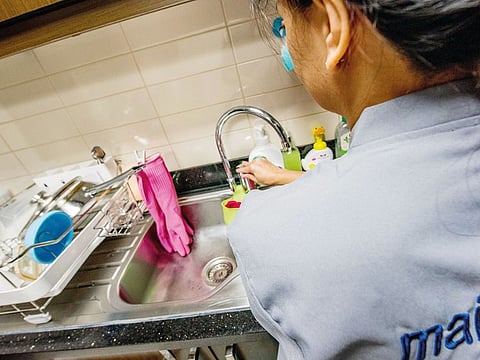UAE: When can a domestic worker transfer to a new employer?
Human resources ministry also specifies cases where the worker can quit the job legally

Abu Dhabi: The Ministry of Human Resources and Emiratisation (MoHRE) has specified three cases in which a domestic worker is entitled to transfer to a new employer.
These cases are:
• The expiration of the employment contract.
• If a court ruling confirms the employer’s breach of obligations toward the domestic worker during the validity of the employment contract.
• If the employer consents in writing to the transfer during the validity of the contract.
The transfer is subject to the ministry’s approval, agreement of all parties, and submission of a request through approved channels.
MoHRE also pointed out that a domestic worker in the UAE is allowed to leave their job in two specific situations, while retaining their rights, provided they notify the ministry of such situations at least two weeks in advance. If the employer fails to address the reasons for leaving, these cases are:
• Reduction of the worker’s wages below the agreed amount stated in the contract.
• Failure of the employer to fulfil their contractual obligations.
The ministry further clarified that a domestic worker has the right to leave their job without prior notice if the employer or their representative physically assaults, insults, or sexually abuses the worker in any manner punishable under the laws in force in the UAE.
In all similar cases, the domestic worker must immediately report the assault to the relevant authorities and notify the ministry within three days of leaving work.
MoHRE stated that, in all the above cases, the domestic worker is required to return to the recruitment agency that brought them to the UAE, stay at the agency, or move to another designated location, ensuring contact details are provided to the ministry.
Additionally, in any of the cases, and without prejudice to the worker’s right to retain their entitlements for the period they worked, the domestic worker is permitted to transfer to a new employer or leave the country under certain regulations determined by the ministry.
Agency’s obligations
The ministry also noted that the executive regulations list seven obligations for domestic worker recruitment agencies:
1. Conducting the necessary medical examination for the domestic worker.
2. Informing the domestic worker of all conditions required by the employer, including experience and educational qualifications.
3. Verifying the availability of required certifications for professions requiring specific qualifications, such as nursing or driving.
4. Enabling the domestic worker to review the job offer, ensuring it matches the contract template to be signed, and obtaining their consent to the terms of the contract.
5. Providing a certificate from the competent authorities in the domestic worker’s home country, confirming they have no criminal record and are of good conduct, in accordance with the ministry’s regulations.
6. Submitting documents and certifications proving the agency deals with officially accredited entities in the worker’s home country.
7. Ensuring the recruitment agency in the worker’s home country is responsible for paying any fees or commissions related to facilitating the worker’s arrival and contract finalization, without the domestic worker bearing these costs.
Refunding the cost of recruiting
Last month, The Ministry of Human Resources and Emiratisation had announced three cases in which the fees and costs of recruiting a domestic worker may be refunded to the employer. These cases are:
• the worker’s lack of professional competence or personal conduct during the probation period of up to three months
• the domestic worker’s unlawful termination of the contract or abandonment of work
• the termination of the contract by the employer due to nonfulfilment of agreed-upon conditions in the contract signed between the employer and the recruitment agency.



